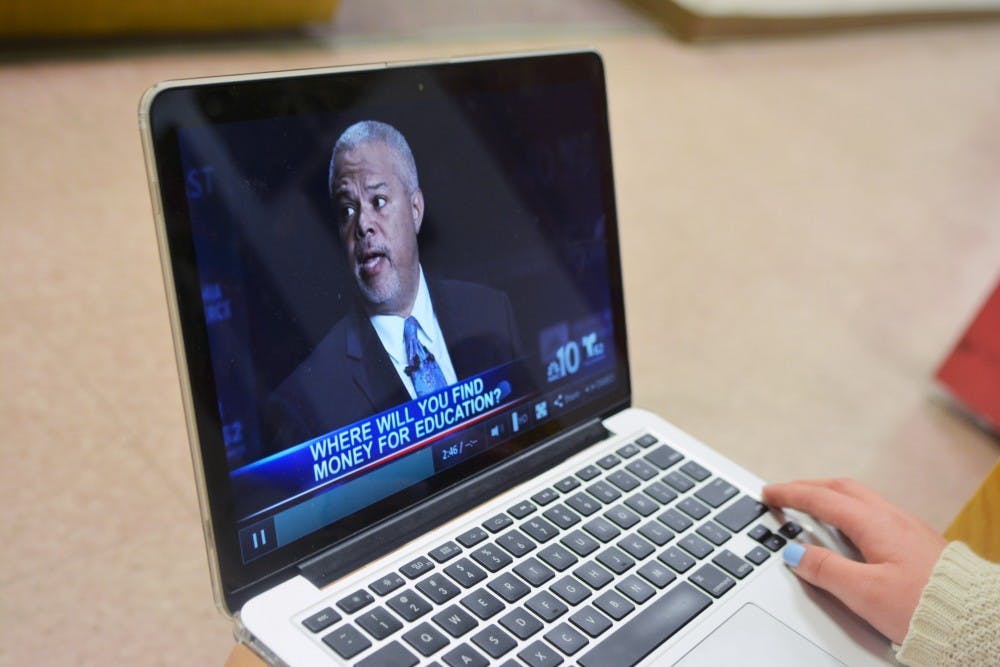
Students were able to stream Tuesday's Philadelphia mayoral debate on NBC and Telemundo.
Credit: Irina Bit-BabikOn Tuesday night, the five Democratic candidates for mayor squared off at the Kimmel Center on NBC10 for the first televised debate of the race.
That is, until former District Attorney Lynne Abraham, 74, collapsed on stage. While fellow candidate state Sen. Anthony H. Williams was answering a question about education funding, Abraham fainted.
She was rushed offstage and brought to a doctor. Moderator Jim Rosenfield later confirmed that Abraham was “doing well” and “resting.” She did not return for the rest of the debate.
Philadelphia Inquirer reporter Claudia Vargas tweeted after the debate that fellow candidate Nelson Diaz spoke with Abraham before she fainted. Abraham allegedly told Diaz that “she hadn’t eaten all day” and was prevented by the doctor from returning to the debate because her “blood pressure was low,” the tweet said.
The remaining four candidates continued discussing topics ranging from personal controversies to the question of education funding sources.
In a telling moment near the end of the debate, all candidates were asked a series of questions with “yes” or “no” answers. The only question that received a uniform “yes” response without qualification or exception was when Rosenfield asked if Philadelphia had a “race-relations problem.”
Rosenfield did not shy away from other hard-hitting subjects, including an awkward question about whether voters could trust former state Sen. Milton Street after his time in federal prison. Street, who was sentenced to 30 months in lockup after failing to pay taxes on close to $3 million in earnings, answered in his typical, irascible style.
“I have a plan that can save your child,” he said. “These other candidates didn’t go to federal prison but they don’t have a plan to save your child.”
Other questions concerned former city councilman Jim Kenney’s often colorful Twitter persona. Kenney had famously tweeted a profanity-laden diatribe about New Jersey Gov. Chris Christie’s support of the Dallas Cowboys football team.
“Twitter is Twitter. It’s 140 characters of nonsense,” he said.
A tense moment occurred early in the debate when Rosenfield grilled Williams about the supposed “dark money” funding his advertising campaign. On Williams’ behalf, the independent group American Cities purchased $600,000 in TV ads, with more money expected to come in the future. Independent groups can now donate unlimited funds for issue-oriented ads per the Supreme Court’s 2010 ruling in Citizens United v. FEC.
“My money isn’t dark anymore. It’s written about every day,” Williams said. Independent advertising assists other candidates as well. Williams pointed out that Kenney's ads are paid for by "dark money."
Kenney, for his part, pleaded ignorance. “I don’t know who is funding my commercials,” he said.
Other contentious moments centered on the mayor’s role in securing funding for Philadelphia. Some candidates were more optimistic than others.
“Gov. [Tom] Corbett cut everything for Philadelphia from your nose to your toes,” Street said.
Before Abraham fainted, all five candidates on stage rejected Mayor Nutter’s proposed 9.34 percent increase in property taxes. Alternative solutions were a mixed bag of funding options, both recurring and one-time sources. Doug Oliver, for example, urged nonprofits in the city to pay PILOTs, or payments in lieu of taxes — a policy that could affect Penn. Street, on the other hand, suggested an “independent funding source” for public schools be established by the state, despite his lack of faith in Harrisburg’s willingness to give more funds.
The Daily Pennsylvanian is an independent, student-run newspaper. Please consider making a donation to support the coverage that shapes the University. Your generosity ensures a future of strong journalism at Penn.
DonatePlease note All comments are eligible for publication in The Daily Pennsylvanian.




